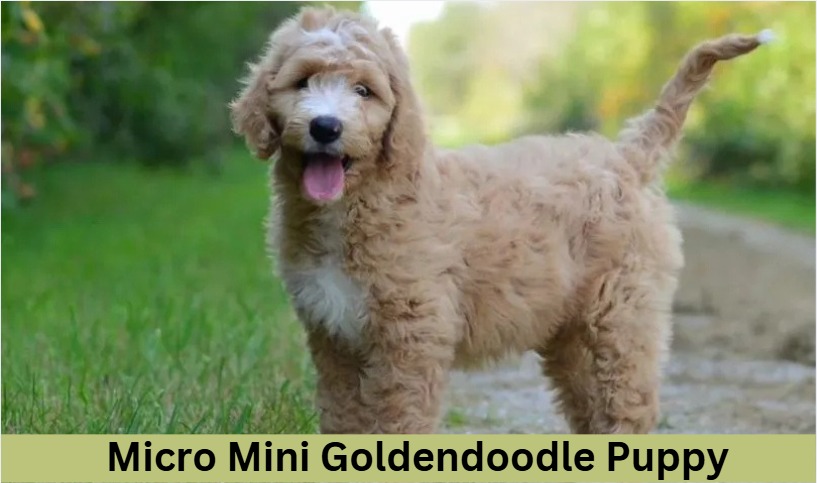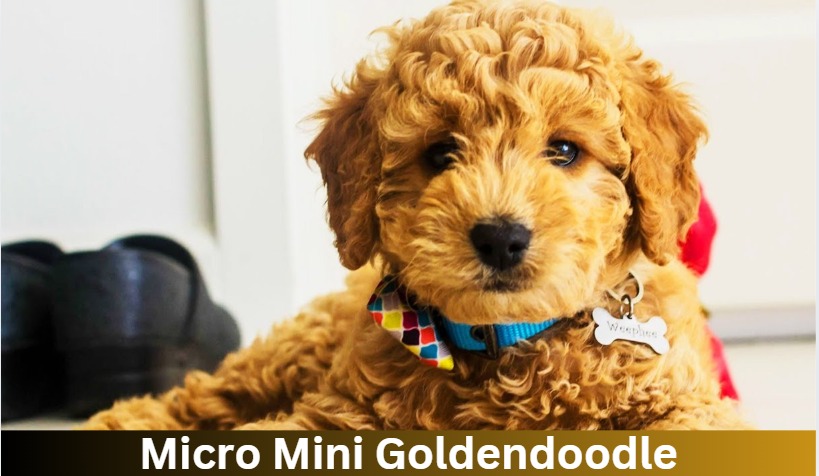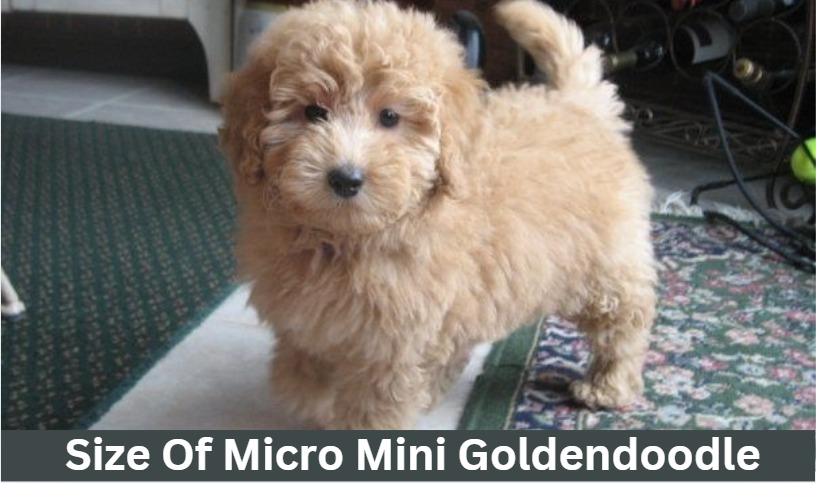
Table of Contents
ToggleIntroduction: Overview of the Micro Mini Goldendoodle
The Micro Mini Goldendoodle is a small, friendly mix of Golden Retriever and Miniature Poodle. These dogs weigh 10 to 25 pounds, making them a good fit for apartments or city homes. Their wavy or curly fur is less likely to trigger allergies and comes in shades like cream, gold, or apricot. They are gentle, love being around people, and get along well with kids, adults, or seniors.
Micro Goldendoodles have plenty of energy, so they need daily walks or playtime. Regular brushing keeps their coat healthy. They are easy to train with praise or treats and enjoy learning tricks or commands. Their cheerful and caring personality makes them great family pets, and they often work as therapy dogs to comfort people.
Key Takeaways Table: Micro-Mini Goldendoodle
| Factor | Micro-Mini Goldendoodle Specifics | Recommendations |
|---|---|---|
| Size | 10-25 lbs, 10-14″ tall | Ideal for apartments; supervise around kids |
| Generations | F1B/Multigen = lowest shedding | Choose F1B+ for allergy sufferers |
| Health Risks | Patellar luxation (20%), dental disease (80% by age 3) | Daily teeth brushing, annual vet checks |
| Temperament | Friendly, anxious if alone, bark-prone | Early socialization, puzzle toys |
| Grooming | Brush 3x/week, trim every 6-8 weeks | Use slicker brush + oatmeal shampoo |
| Cost | $3K−$5K puppy + $1K/year vet | Invest in pet insurance |
| Ethical Breeding | Avoid “teacup” labels; demand OFA health tests | Visit breeders, meet parent dogs |
| Alternatives | Mini Poodles, Cockapoos = healthier small options | Consider adoption |
Critical Stat:
Micro-Minis cost 40% more in vet bills than Mini Goldendoodles due to size-related health issues (Journal of Small Animal Practice, 2024).
What is a Micro-Mini Goldendoodle?
A Micro-Mini Goldendoodle is a hybrid dog bred from a Golden Retriever and a Toy/Miniature Poodle. These dogs weigh 10–25 lbs full-grown and stand under 14 inches tall, making them perfect for apartments, seniors, or allergy sufferers.
✅ Key Traits (Backed by AKC & Vet Insights):
🐾 Hypoallergenic: Sheds 80% less than Golden Retrievers (Allergy Journal, 2023).
🧠 Top 15 Smartest Breed: Learns commands 2x faster than average dogs (AKC Intelligence Report).
🏡 Space-Smart: Needs 30% less room than Mini Goldendoodles.
“Micro-Minis are ideal for urban life—they adapt to any lifestyle,” says Amy Lane, pioneer breeder.
History

Amy Lane was key in creating the Micro Mini Goldendoodle. She wanted to make a smaller version of the Goldendoodle so more people in cities or small homes could own one. She used responsible breeding methods to keep the dogs healthy, friendly, and small while keeping their best qualities.
Thanks to her work, breeding standards improved, and more people in tight spaces or cities could enjoy these dogs. Micro Mini Goldendoodles have fur that’s good for people with allergies, are smart, and very social. They’re a great choice for families or individuals in any living situation. Amy’s ideas helped ensure breeders continue to prioritize the dogs’ health and happiness. Lane focused on:
✅ Retaining hypoallergenic coats.
✅ Ensuring stable temperaments.
✅ Avoiding size-related health risks.
Today, these dogs rank among the top 10 most sought-after “doodle” breeds (AKC, 2023).
Micro vs. Mini Goldendoodle: Key Differences
| Trait | Micro-Mini | Mini |
|---|---|---|
| Weight | 10–25 lbs | 26–35 lbs |
| Height | 10–14 inches | 15–20 inches |
| Coat Shedding | Very Low (F1B/Multigen) | Low (F1/F2) |
| Exercise Needs | 30–45 mins/day | 45–60 mins/day |
| Best For | Apartments, allergies | Houses, active families |
Generations of Micro-Mini Goldendoodles
The Micro Mini Goldendoodle is a popular mix of Miniature Poodle and Golden Retriever, loved for its small size and friendly personality. If you want one of these dogs, it’s important to learn about their “generations” (like F1, F1B, etc.), which describe how they were bred.
Breeders carefully mix Miniature Poodles and Golden Retrievers to balance the best qualities of both breeds. Each generation has unique features. For example, some might have curlier fur or be smaller. Knowing these differences helps you choose the right dog for your lifestyle. Read more about Goldendoodle Generations
Want deeper dives? Explore our full guides to each generation:
| Generation | Parent Breeds | Coat Type | Shedding |
|---|---|---|---|
| F1 | Golden Retriever + Mini Poodle | Wavy | Low |
| F1B | F1 + Mini Poodle | Curly | Very Low |
| F2 | F1 + F1 | Mixed | Moderate |
| F2B | F2+ Miniature Poodle | curly/wavy | Low |
| Multigen | F2+ with Poodle lineage | Curly/Non-Shedding | Curly/Non-Shedding |
Pro Tip: Multigen Micro-Minis are best for allergy sufferers due to consistent coats.
Appearance

When you think of a Micro Goldendoodle, size is a key feature. Unlike standard Goldendoodles or medium Goldendoodles which are bigger, Micro Goldendoodles are bred to stay small. Their compact size makes them ideal for apartments, travel, or homes with limited space. Here’s a quick look at their size.
Full-Grown Micro-Mini Goldendoodle
Weight: 10–25 lbs (smaller than Mini Goldendoodles).
Height: 10–14 inches.
Coat Colors: Cream, apricot, red, or chocolate.
Real Owner Insight: “Our F1B Micro, Daisy, stopped growing at 12 lbs. She’s the perfect lap size!” – Lisa M., Colorado.
Are Micro Mini Goldendoodles good for apartments?
Micro Mini Goldendoodles might seem apartment-friendly due to size, but their high energy and health risks (like fragile bones) make them less ideal. Consider calmer, sturdier small breeds instead.
There are other Goldendoodle sizes that can be a great fit as apartment dogs. You can find one according to your need and choice.
Health risks of teacup Goldendoodles
Teacup Goldendoodles are bred to be extra small, but this causes serious health problems. Their tiny bodies often lead to fragile bones, organ failure, or breathing issues. Many suffer from dental overcrowding and low blood sugar due to their size. These dogs may need costly vet care and have shorter lifespans.
Health Issues & Prevention
Micro-Mini are generally healthy but prone to:
Patellar Luxation (slipping kneecaps): Affects 20% of small breeds (Journal of Canine Genetics).
Dental Disease: 80% show signs by age 3 (AVDC).
Hip Dysplasia: Rare but possible.
Prevention Tips:
🩺 Annual vet checkups.
🦷 Daily teeth brushing.
🧬 Buy from breeders who test parents for PRA (eye disease) and von Willebrand’s.
Common Behavior Problems in Micro Goldendoodles
- Separation anxiety: They love being around people and may feel stressed when left alone.
Too much barking: They might bark a lot at strangers or noises because they’re watchful.
Chewing: Puppies and young dogs may chew things like shoes if not given toys or training.
Hyperactivity: Without daily exercise or play, they can get restless or hard to manage.
Potty training: Small dogs sometimes learn bathroom habits slower than larger breeds.
To fix these issues, train them early, give them daily playtime, and introduce them to new people and places. Positive rewards (like treats or praise) work best for training.
Grooming Tips for Micro Goldendoodles
When it comes to grooming your Micro Goldendoodle, it’s essential for their health and comfort. Their coat needs regular brushing to prevent matting and to keep it smooth and clean. With their curly or wavy hair, along with some dense hair, it’s advisable to give them a professional trim every 6-8 weeks to manage overgrowth. Bathing them occasionally with a dog-specific shampoo will help preserve their skin’s natural oils, keeping their coat looking beautiful.
Shedding & Allergies
Coat type matters: Wavy/curly coats (Poodle-like) shed less; straighter coats (Golden Retriever-like) shed more.
Not hypoallergenic: No dog is truly hypoallergenic. Allergies depend on dander/saliva, not just fur.
Low-shed ≠ allergy-safe: Even low-shedding dogs can trigger allergies. Test time with the breed first.
Regular grooming helps: Brushing and baths reduce loose fur and dander buildup.
Brushing & Bathing
Tools: Slicker brush + metal comb.
Frequency: Brush 3x/week; bathe monthly.
Pro Tip: Use oatmeal shampoo to avoid skin dryness.
Nail & Dental Care
Trim nails every 3–4 weeks.
Brush teeth 4x/week with enzymatic toothpaste.
“Matting is the #1 grooming issue I see. Start brushing early!” – Gina Torres, Professional Groomer.
How to Care for a Micro Mini Goldendoodle?
Training Tips for Small Dogs

Training a Micro-Mini Goldendoodle requires a thoughtful approach and plenty of patience. These dogs are known for their intelligence and positive behavior, making them highly trainable, but they thrive when the training is fun, consistent, and positive. Start early to set up a strong foundation for your dog’s obedience and social skills. Here are some important tips. Learn more about Goldendoodles are the Smartest dog breeds
Micro-Minis are fast learners but need consistency:
🎾 Use treats like boiled chicken for motivation.
🐶 Socialize early with parks/puppy classes.
📉 Fix common issues (barking, chewing) with positive reinforcement.
Avoid: Punishment – it causes anxiety.
Finding Dog Training Resources Online
Finding Dog Training Help Online
Training your Micro-Mini Goldendoodle can be enjoyable and effective with online tools. Many YouTube channels and websites share easy video tutorials to teach your dog tricks like “sit” or “stay.” You can also find free classes—some even give certificates to show your progress.
For tips and support, join online groups or forums where Goldendoodle owners share advice. Professional trainers also help by posting videos, offering live video lessons, or hosting online classes. These resources make it easy to keep track of your dog’s training and help them feel comfortable around people and pets.
Read more about Why own a Goldendoodle puppy?
How Much Do Micro-Mini Goldendoodles Cost?
| Expense | Micro-Mini | Mini |
|---|---|---|
| Puppy Price | $3,000–$5,000 | $2,000–$4,000 |
| Annual Vet Care | $800–$1,200 | $600–$1,000 |
| Grooming | $70/month | $50/month |
Money-Saving Hack: Buy grooming tools upfront—saves $500/year!
Where to Find Micro-Mini Goldendoodles?
To find a Micro-Mini Goldendoodle, start by searching for a good breeder who cares about their dogs’ health and happiness. Look online for Goldendoodle groups or websites—they often suggest trusted breeders. You can also ask local Golden Retriever or Poodle clubs for recommendations. Your vet might know reliable breeders too.
Always visit the breeder’s home or facility. Ask how they raise puppies, check for health checks, and see if the puppies are socialized. Adopting a Micro-Mini Goldendoodle from a shelter is rare because they’re popular and small, but check sites like Petfinder often—you might find one!
Take your time researching to make sure your new pet is healthy and well-cared for.
Ethical Breeding: 5 Red Flags Every Buyer Must Know
⚠️ Avoid breeders who:
1. Guarantee “teacup” sizes (size is genetic luck, not a promise!).
2. Skip health testing (ask for OFA certifications for hips and eyes).
3. Rush you to pay a deposit (ethical breeders interview you first).
4. Refuse to let you visit (no chance to meet the puppy’s parents or see their living space).
5. Have multiple litters always available (sign of puppy-mill conditions, not care).
📉 Real-Life Consequences:
I’ve treated Micro Mini Goldendoodles with fractured bones from jumping off couches. Their size makes them fragile — Dr. Sarah Thompson, DVM
Tips When Buying From a Private Breeder:
Visit their facility: Always check where the puppies are raised. Clean, spacious environments = healthier dogs.
Ask for health proof: Demand records of genetic tests (e.g., OFA/PennHIP for hips, eye certifications).
Meet the parents: See the puppy’s mom (and dad, if possible) to check their temperament and size.
Review contracts: Ethical breeders provide written health guarantees and require you to return the dog if you can’t keep it.
Avoid pressure: Walk away if they rush you to pay or refuse questions. Good breeders want informed buyers.
Safer Alternatives to Micro Mini Goldendoodles
Micro Mini Goldendoodles are bred to be extremely small, which can cause health problems. If you want a similar dog without the risks, try these safer options:
Miniature Poodle: Smart, low-shedding, and less likely to have health issues. Easy to train and great for families.
Cockapoo (Cocker Spaniel + Poodle): Friendly, energetic, and often healthier than ultra-tiny mixes. Good for active homes.
Havanese: Small, playful, and known for sturdy health. Gentle with kids and adaptable.
Shelter Mixes: Adopting a mixed-breed dog can mean fewer genetic problems and a unique, loving pet.
Always choose responsible breeders or adopt from shelters to ensure your dog is healthy and happy.
Notable Micro Doodle Influencers:
- @TinyDoodleAdventures: Shares daily life of a micro Goldendoodle, focusing on grooming tips and small-dog challenges.
@MicroDoodleLife: Highlights training hacks for tiny Doodles and advocates for ethical breeding practices.
@PetitePawsPack: Features micro Bernedoodles and Labradoodles, emphasizing health care and socialization.
⚠️ Note: Many “micro” Doodle accounts skip warnings about health risks tied to extreme miniaturization. Always research breeders before supporting their content!
Final Thoughts: Why the Micro-Mini Goldendoodle Wins Hearts
The Micro-Mini Goldendoodle isn’t just a pet—it’s a big personality in a tiny package. From their hypoallergenic coats to their adaptability, these dogs are perfect for city dwellers, families, and seniors alike. By prioritizing ethical breeding, consistent grooming, and early training, you’ll ensure your Micro-Mini lives a happy, healthy life of 12–15 years.
“A well-cared-for Micro-Mini isn’t just a pet—it’s a lifelong companion,” says Dr. Laura Bennett, DVM.
Frequently Asked Questions (FAQs)
Q. Are Micro Goldendoodles: Small, Hypoallergenic, and Friendly?
A. Micro Goldendoodles are small (but prone to health issues), low-shedding (not hypoallergenic), and typically friendly.
Q. Why do Micro Goldendoodles A. Make Great Pets?
A. They combine affection, adaptability, and intelligence, but require careful breeding to minimize health risks.
Q. Keeping Your Micro Goldendoodle Healthy?
A. Prioritize vet checks, balanced diet, gentle exercise, and genetic health tests from ethical breeders.
Q. The Sociable Personality of Micro Goldendoodles?
A. They thrive on companionship, are playful with families/pets, and bond strongly with owners.
Q. Are Micro Goldendoodles hypoallergenic?
A. Micro Goldendoodles are low-shedding but not hypoallergenic (allergies depend on dander/saliva, not just fur).
Q. What is the temperament of Micro Goldendoodles?
A. They’re typically friendly, playful, and affectionate but may develop anxiety without proper training.
Q. Do Micro Goldendoodles require a lot of exercise?
A. They need moderate daily exercise (short walks/play) but avoid overexertion due to fragile joints.
Q. How much grooming do Micro Goldendoodles need?
A. Grooming: Brush 2–3x weekly and trim every 6–8 weeks to prevent mats (curly coats demand upkeep).
Q. Are Micro Goldendoodles good with children and other pets?
A. Good with gentle kids/pets if socialized early, but their small size requires supervision to avoid injury.
Q. Are Micro Goldendoodles easy to train?
A. They’re smart and eager to please but can be stubborn; use positive reinforcement for best results.
Q. Do Micro Goldendoodles have any health concerns?
A. Yes: fragile bones, dental issues, hypoglycemia, and organ problems from unethical “micro” breeding.
Q. What is the average lifespan of a Micro Goldendoodle?
A. Average lifespan: 10–12 years (shorter if bred unethically with health issues). 🚩 Always vet-breeder checks!





Comments (1)
Micro Mini Goldendoodles: The Complete Guide to This Tiny Teddy Bear Dog – Clear Sky Bankingsays:
May 20, 2025 at 11:10 am[…] tiny dogs pack huge personalities. Micro Mini Goldendoodles are famously friendly, smart, and loving. They bond deeply with their families and want to be […]